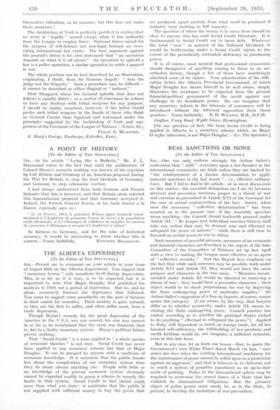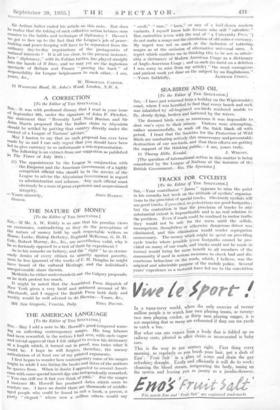REAL' SANCTIONS OR NONE
[To the Editor of THE Sanciivion.] Sin,--One can only, endorse strongly Sir Arthur Salter's contention that " mild " restraints upon a law-breaker in the international community are futile unless they are backed by " the reinforcement of a known determination to apply
material sanctions in the last resort "—i.e., effective military • force. But I fail to find in' his article—or in most discussions on this matter—the essential distinction (as I see it) between deterrent and preventive measures proper to a threat of war and coercion as prescribed in Article XVI of the Covenant for the ease of actual contravention of the law. Surely, when once the necessary " collective determination " has been assured, as in the present case—if the Assembly speeches mean anything—the Council should forthwith proceed •under, Article XI—" the League (not individual member-States) shall take any action that may be deemed wise and effectual to safeguard the peace of nations "—while there is still time to forestall an actual resort to war in Africa.
Such measures of peaceful pressure, measures of an economic and financial character, are described in the report of the Sub- Committee of the Committee of Thirteen set up last April with a view to making the League more effective as an agent of " collective security." And the Report lays emphasis on the fact that while such measures may be possible, both under Article XVI and Article •XI, they would not have the same purpose and character in the two cases. " Measures • recom- mended under Article XI would be directed to removing, a threat of war ; they Would have a preventive character ; their- object would be to check preparations for war, by depriving the State endangering. peace of particular supplies." Sir Arthur Salter's suggestion of a ban on imports, of course, comes• under this category. (I am aware, by the way; that lawyers differ as to whether unanimity, under Article XI, means in- cluding the State endangering peace. Council' practice has varied, according as to whether the principal States wished to do anything " effectual to safeguard the peace.") Applied, to Italy, still dependent so much on foreign trade, for all her boasted self-sufficiency, the withholding of key-products and credit facilities would be, one imagines, a sufficient restraint, even at this late hour. •
But in any case, let us learn our lesson—that, to quote the Government's own White 'Paper dated March 1st last, " once action has been taken the existing international machinery for the maintenance of peace cannot be relied upon as a protection against an aggressor," and that it behoves us to elaborate not so much a :system of penalties • (sanctions) as an up-to-date mode of policing. Police in the international sphere may be required to' overcome the armed forces of a State that has violated its international obligations. But the primary object of .police power must surely be, as in the State, • to prevent, to develop the technique of war-prevention.
Sir Arthur Salter. ended his article on this note. But does. he realise that the taking of such collective action betimes runs counter to the habits and technique of diplomacy ?. Haven't :we got to face up to the fact that the League's job of peace-• making. and peace-keeping will have to be separated from the- ordinary day-to-day negotiations of the protagonists of national interests ? It is all too clear, in the present instance, how " diplomacy," with its Fabian tactics, has played straight into the hands of Il Duce, and we may yet see the inglorious spectacle of Britain and France " passing the buck " of responsibility for League helplessness to each other. —I am; Yours, &c., W. HonsrALL CARTEL - 11 Woronzow Road, St. John's Wood, London, N.W. 8.







































 Previous page
Previous page